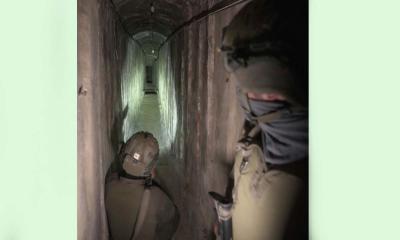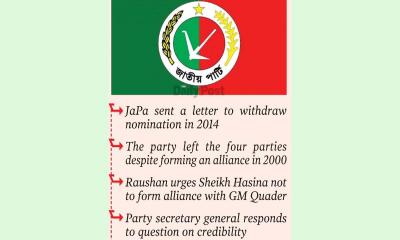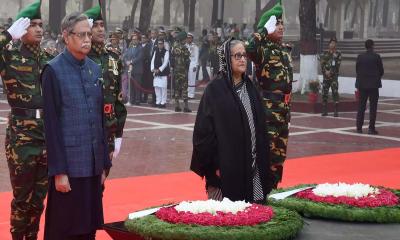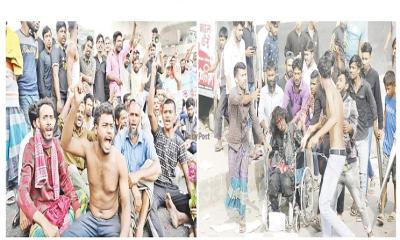The International Monetary Fund (IMF) approved the second tranche of $682 million for its ongoing loan programme with Bangladesh. This money will be added to the reserve next Friday. The IMF said the loan was approved on condition that the ongoing reform activities continue. The agency said in a press release yesterday. Earlier, the Ministry of Finance and Bangladesh Bank (BB) confirmed the loan approval. Economists said that the amount of dollar support received from the IMF for loans is not possible to overcome the ongoing crisis. However, an atmosphere of trust will be created to some extent as other donors follow the IMF.
BB spokesman Mezbaul Haque said at a press conference yesterday that the reserve will get some relief in December based on the installments received from various donor groups. He said the second tranche of $680 million could come on Friday. Besides, another $130 million will come from other sources, including $400 million from ADB, $90 million from South Korea in December this year. And based on these money, the country's foreign exchange reserves will increase slightly. In all, $ 1.31 billion will be added to the reserve in December. Although there are ACU payments in January, the first month of the new year. There will be a little more than a billion dollars out of the reserve (payment will be made).
According to the central bank data, the country's foreign exchange reserve stood at $19.13 billion as of yesterday. According to BB’s own estimates, the reserve is 24.66 billion dollars.
Earlier, the second installment was approved at a meeting of the Executive Board of the IMF held at the IMF headquarters in Washington DC on Tuesday (December 12) at 9 am local time. After the meeting, a press release from the organization said that the second installment has been approved on the condition of continuing the ongoing renovation activities. The IMF has made a set of suggestions, including recommendations to continue the ongoing financial reforms to reduce the pressure on Bangladesh's macro-economy during the release of the second tranche of loan program. The directors collectively said that if short- and long-term reforms in the financial sector continue, restoring macroeconomic stability, increasing the capacity to deal with risks caused by foreign pressure, the reserves will remain above 24 billion by the end of this year.
For this, the IMF has kept the advice of strengthening the regulatory framework of the financial sector, tight monetary policy, making the exchange rate market-oriented, reducing default loans and increasing revenue collection.
In order to restore macroeconomic stability of Bangladesh, the organization suggested giving more importance to three things, further tightening the monetary policy, neutral fiscal policy and making the exchange rate market-oriented. Bangladesh's macro-economy has gone through multiple risks in recent years; this issue was also discussed.
The impact of the Ukraine-Russia war has hampered the global interest rate hike hampering Bangladesh's post-COVID-19 economic recovery. GDP growth slowed to 6 per cent and inflation hit a decade-high of 9.9 percent in August 2021. After that, Bangladesh went on the policy of import contraction. As a result, the current account deficit decreased, unexpectedly falling into a financial account deficit where there was a surplus. Global uncertainty and inadequate policy decisions put pressure on Bangladesh's foreign exchange reserves and the value of taka against the dollar. Inflation is expected to be 7.25 percent by the end of 2023-24 fiscal year if the current tight monetary policy continues.
On the other hand, the central bank has been saying that inflation will come down to 8 percent by the end of December and 6 percent by the end of June. For this, the monetary policy will be tightened and the policy interest rate will increase further if necessary. The IMF said that if the emphasis is on repatriation of export earnings in time, Bangladesh's financial figure will improve. The reserve will also gradually increase and at the end of the current financial year, it will be able to meet the import liabilities for four months.
The IMF also expects Bangladesh's gross foreign exchange reserves to reach $24.3 billion by the end of June. However, the level of global uncertainty and domestic risk has increased in Bangladesh than before.
After the board meeting, IMF Deputy Managing Director and Acting President Antoinette Sayegh said, "The economy of Bangladesh is facing multifaceted economic challenges. Despite the tough global pressure on Bangladesh, the implementation of the loan program is on the right track due to the strong commitment of the regulatory body. The loan-supported program is helping to revive the macroeconomic and protecting vulnerable people. The ongoing macroeconomic structural reforms will accelerate potential growth and climate change programs."
Antoinette Sayegh added that medium-term policy measures taken to control inflation and address global risks should continue. For this, it is necessary to set a cautious and tight monetary policy, neutral fiscal policy and market-oriented easy exchange rate, which will reduce the pressure on the economy.
Increasing revenue collection and bringing government spending to a reasonable level will be able to meet the costs of social development and climate change," he said, adding that strengthening the foreign exchange market management will increase the capacity to deal with global risks. It is necessary to increase the capacity of the government to manage money and investment; to reduce government spending and fiscal risks.
In the executive meeting, the directors made several observations on Bangladesh and made recommendations. These include strengthening the implementation of tax policy and administrative measures for revenue collection, rationalization of subsidies, increasing spending capacity and better managing financial risks.
Stating that it is important to take forward the reforms of the financial sector step by step for macroeconomic stability, it is necessary to take effective initiatives to reduce the default loans of the banking sector and emphasize the strategy of restoring the capital deficit of the state-owned banks.
The directors agreed that increasing the supervision of the regulatory body, strengthening the policy-making and regulatory framework, strict governance and improving the capital market will increase the capacity of the financial sector and make the necessary sources of financing available to achieve the growth targets.
Liberalizing trade, improving investment climate and governance, improving the labour force, and increasing female labour force participation are critical to attracting more FDI, diversifying exports, and boosting growth prospects, the IMF said.
Bangladesh's actual reserves are now less than $16 billion. In August 2021, Bangladesh's reserves were $48 billion. Asked how much role the IMF's second tranche of loans will play in tackling the reserve crisis, SANEM Executive Director Dr Selim Raihan said, "The amount of this loan is not that much compared to the need. Still, if we get this installment of the loan, then the reserve situation will improve somewhat. More than that, getting the second installment of the IMF loan during this economic crisis of Bangladesh will work as a positive one. It will help restore confidence in the economy as a whole, including domestic and foreign investors."
He also said that some loans will also be available from the World Bank and ADB. The IMF loan waiver helps with that. Everyone follows the IMF assessment. When the IMF gave the first loan, the World Bank also gave the loan. However, the deep crisis that Bangladesh is in with the entire economy, including the reserve, cannot be overcome with this small amount of IMF loan. First of all, we need economic reform. But the issues of reform are not yet clear. It is said that it will be done after the election. The roadmap needs to be finalised before the election.
ARS












